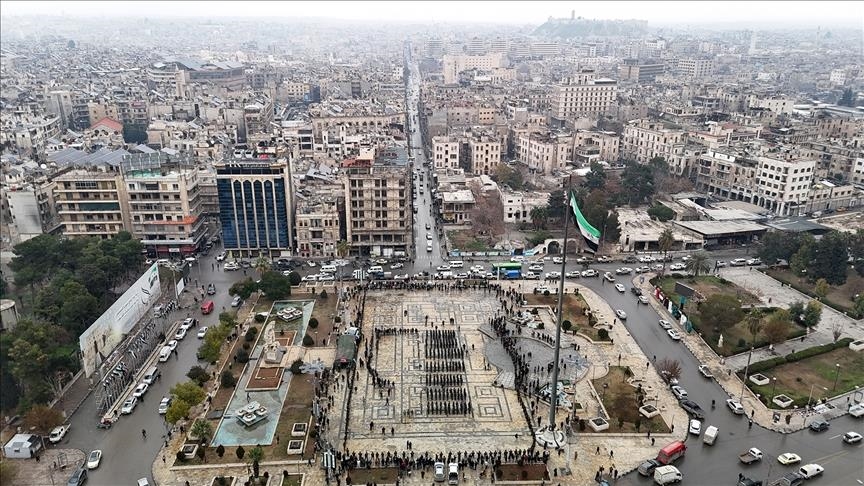Western countries move toward lifting sanctions on Syria
EU decides to lift penalties, Trump announces sanctions to lifted during Gulf tour, as Syria going through political transformation, reconstruction following end of Assad regime

BRUSSELS/WASHINGTON
Western countries, such as the US, and the EU, are moving toward lifting sanctions against Syria following the fall of the Assad regime, amid the country’s political transformation process.
The formation of a new government in Syria poses an opportunity to do away with the sanctions imposed on the previous Ba’athist regime, which is of great importance for the country’s reconstruction.
The US and the EU’s announcements on lifting sanctions have been regarded as an important step in the country’s economic recovery.
The decision was made by the EU during a foreign ministers’ meeting Tuesday in Brussels. Kaja Kallas, EU foreign affairs chief, said the bloc decided to lift sanctions against Syria to enable it to rebuild.
The EU will allow member states to provide funding for cooperation with Syrian defense and interior ministers on reconstruction, capacity building, counter-terrorism efforts and migration, under the new measures. Sanctions against the central bank are also expected to be lifted.
The EU took the first positive step against Syria in February during a meeting in Brussels in which foreign ministers decided to suspend sanctions against Syria’s banking, energy and transportation sectors, while removing Syria’s Industrial Bank, Popular Credit Bank, Saving Bank and Syrian Arab Airlines from the sanctioned list.
Certain exemptions were made on the ban on banking relations between EU and Syrian banks to allow transactions on the energy and transportation sectors, as well as transactions for humanitarian aid and reconstruction efforts.
Beginning of EU sanctions on Syria
Eu countries implemented several measures starting around 14 years ago to end the Ba’athist regime’s violence against civilians and to push the regime to bring reforms and stop human rights violations in a bid to encourage a peaceful political transition.
The EU suspended all cooperation with the Syrian government and its supporters in May 2011, following the escalation of violence and human rights violations, by imposing economic sanctions and arms embargoes.
Travel bans and asset freezes were also included in the sanctions, such as critical figures in Bashar al-Assad’s inner circle.
Trade in precious metals and traditional products was also prohibited.
Trump’s decision to lift sanctions
US President Donald Trump said last week during his Gulf tour that he would lift sanctions against Syria after talks with Turkish President Recep Tayyip Erdogan.
Trump said he wants to see peace and stability in Syria after so much suffering.
Before the Gulf summit, Trump talked to Syrian President Ahmed al-Sharaa at a meeting last week, which was attended by Saudi Crown Prince Mohammed bin Salman and Erdogan via online -- the first leadership-level contact between the US and Syria in 25 years.
US Treasury Secretary Scott Bessent said steps were taken to ease sanctions on Syria to ensure stability and progress.
The World Bank announced Syria’s $15.5 million debt had been paid off by Saudi Arabia and Qatar after Trump’s visit.
In January, the US Treasury Department said it granted a six-month exemption to facilitate humanitarian aid going into Syria, allowing government agencies to act and certain energy and other transactions to be made.
The Office of Foreign Assets Control (OFAC) allowed non-commercial and personal money transfers until July 7 to support the sale, supply, storage, or donation of energy, oil, and petroleum products, as well as natural gas and electricity via Syria’s Central Bank.
US sanctions on Syria
The US began sanctioning Syria in 1979 when it was declared a “state sponsor of terrorism” to ban its defense exports and controls on the export of civilian and military use products, as well as some financial restrictions.
The civil war in Syria that broke out in 2011 rendered US sanctions much more comprehensive, with trade bans on energy and finance sectors that generated income for the Assad regime, freezing of senior officials’ assets and the prevention of US enterprises from conducting business with Syria.
The Caesar Act, signed by Trump in 2019 and implemented in June 2020, expanded on the sanctions to target foreign individuals and organizations to put more pressure on the regime to isolate it from the international community.
The central bank was targeted by the sanctions to stop the regime from financing its operations.
The US sanctions against Syria are one of the most comprehensive economic restrictions imposed on a country.
UK lifts sanctions on 12 institutions, organizations in Syria
The UK lifted sanctions on 12 institutions and organizations in Syria.
The previously sanctioned bodies included the defense and Interior ministries of according to His Majesty’s Treasury.
The assets of the institutions in question are no longer frozen with the lifting of the UK sanctions.
Anadolu Agency website contains only a portion of the news stories offered to subscribers in the AA News Broadcasting System (HAS), and in summarized form. Please contact us for subscription options.







